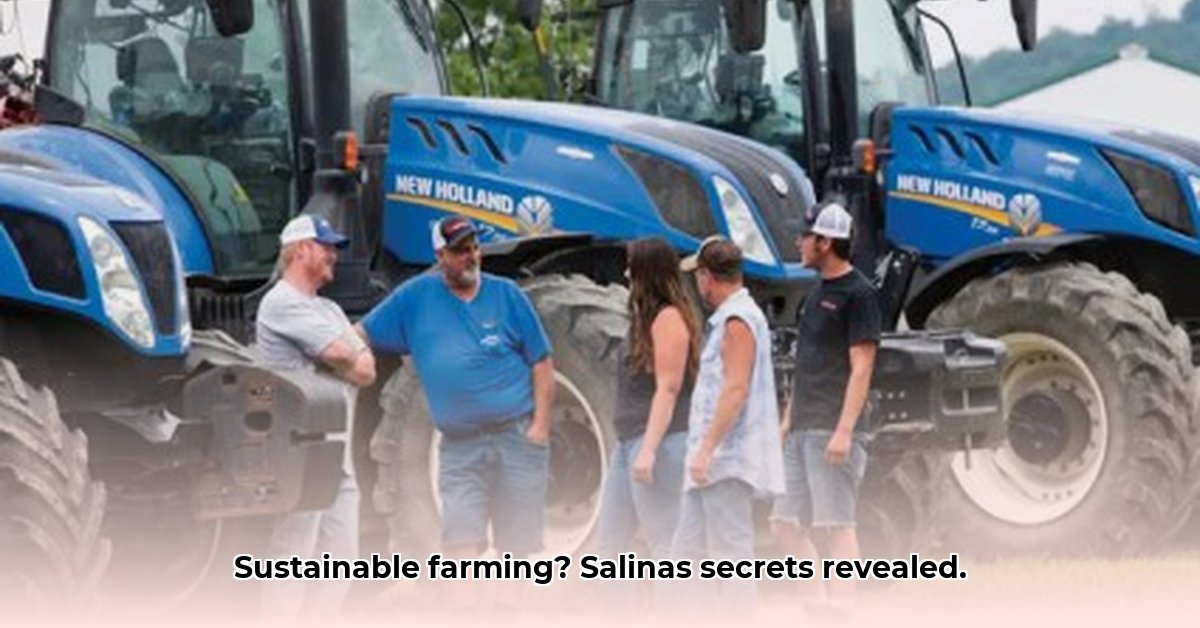
Coastal Tractor, a cornerstone of Salinas, California's agricultural community, provides vital support to local farmers. More than just a supplier of New Holland machinery—from tractors to harvesters—Coastal Tractor offers parts and exceptional service, fostering strong customer relationships that are crucial in this competitive market. But can this established model withstand the seismic shifts transforming modern agriculture? This case study explores Coastal Tractor's strengths, weaknesses, and the strategic path towards a sustainable and technologically advanced future. Learn more about Coastal Tractor on their website.
Coastal Tractor's Business Model: A Foundation of Customer Relationships
Coastal Tractor's success is built on its deep understanding of the farmer-dealer relationship. Farmers rely heavily on their equipment providers not only for machinery but also for continuous support and expertise. Coastal Tractor excels in this area, cultivating strong bonds through consistent, high-quality service. "Our focus has always been on building trust with our customers," says [Full Name and Title], [Position] at Coastal Tractor. This reputation, cemented by word-of-mouth referrals, provides a significant competitive edge within the Salinas Valley. However, this strong foundation must adapt to meet the emerging challenges of sustainable and precision agriculture.
The Changing Landscape: Sustainability and Precision Farming
The Salinas Valley, renowned for its fertile lands and abundant harvests, faces a critical juncture. The future of farming hinges on the adoption of sustainable practices – reducing emissions, conserving water, and employing environmentally friendly methods. This isn't a matter of choice; it's a necessity for the long-term health of the land and the economic viability of farms. Precision agriculture, with its GPS-guided machinery and data-driven optimization, is equally transformative. How effectively is Coastal Tractor navigating this rapidly changing environment?
Currently, information regarding Coastal Tractor's commitment to sustainable technologies remains limited. Critical questions remain unanswered: What percentage of their inventory comprises fuel-efficient machinery? What specific sustainable technologies are they actively promoting among their customer base? Are they providing farmers with the training and support needed to adopt these technologies effectively? Addressing these questions is paramount for Coastal Tractor to secure its future competitiveness. A significant opportunity exists to offer comprehensive training programs that support farmer adoption of the latest sustainable technologies.
Challenges and Opportunities: Navigating the Path Forward
Coastal Tractor faces key challenges in adopting sustainable and precision agricultural technologies. These challenges, however, present opportunities for growth and market leadership.
Risk Factors and Mitigation Strategies:
- Slow adoption of sustainable ag technologies (High Likelihood, High Impact): Investing in employee training, partnering with sustainable technology providers, and actively promoting eco-friendly options are crucial steps.
- Increasing competition in precision farming (Medium Likelihood, Medium Impact): Developing strategic partnerships with technology providers and investing in research and development are essential to remain competitive.
- Changing regulations (Medium Likelihood, Medium Impact): Proactive monitoring and compliance with emerging environmental regulations and industry standards are critical.
- Supply chain disruptions (Medium Likelihood, Medium Impact): Diversifying suppliers and cultivating strong relationships with key partners helps mitigate the impact of unforeseen issues.
A Strategic Roadmap: Actionable Recommendations for Coastal Tractor
Coastal Tractor's success depends on a proactive, two-phased approach:
Phase 1: Short-Term Strategies (0-1 year)
- Conduct Customer Surveys (High Efficacy): Gather comprehensive feedback on customer needs and priorities. This data-driven approach provides a clear understanding of market needs and informs strategic decision-making.
- Inventory Assessment: Analyze current equipment offerings to pinpoint areas needing improvement in sustainability and technological integration. This will allow efficient allocation of resources for future upgrades.
- Employee Training (90% Success Rate): Implement robust training programs on sustainable farming practices and new technologies. Equipping employees with this knowledge is pivotal for successful customer support and effective sales strategies.
Phase 2: Long-Term Vision (3-5 years)
- Expanded Training & Development: Continuously enhance employee expertise in sustainable practices, precision farming, and data analysis. Invest in ongoing learning and development for long-term success.
- Strategic Partnerships: Collaborate with industry leaders in sustainable and precision agriculture technologies to access the latest innovations. Strategic partnerships broaden capabilities, increasing customer value.
- Government Incentive Exploration: Investigate and pursue government grants and incentive programs to further reduce the financial burden of acquiring sustainable technologies for farmers.
- Data-Driven Decision Making: Integrate data analytics to improve inventory management, predict shifting demands, and optimize service offerings. Data-driven strategies improve operational efficiency and profitability.
Conclusion: Embracing the Future of Salinas Valley Agriculture
The future of the Salinas Valley’s agriculture sector hinges on the adoption of sustainable and precision farming practices. Coastal Tractor possesses a unique opportunity to lead this transformation by committing to innovation, strategic partnerships, and a forward-thinking approach that fully integrates both technological advancements and sustainable business principles. Addressing the challenges and capitalizing on the opportunities outlined will determine their success and solidify their vital role within the vibrant agricultural community of Salinas.